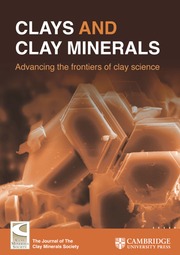Article contents
Use of atomic force microscopy for examining wet clay
Published online by Cambridge University Press: 01 January 2024
Abstract
Clays and their composites have been widely used for secondary containment walls for underground storage tanks and landfills. The pore-size changes occurring in the clay have a profound effect on its permeability. This study presents a new method for evaluating the use of an atomic force microscope (AFM) for studying wet clay in a non-aqueous state in order to determine the pore-size of clay at various water contents, a type of study typically performed by the more expensive environmental scanning electronic microscope. The method consists of mounting a sponge saturated with water under the sample in order to prevent drying by the heat generated by the AFM electronics. The micro-scale AFM image results show that the clay-particle separations reduce linearly as the water content increases. This change in pore-size is postulated to be attributed to the reduction in the size of the diffuse double layer and more extensive hydrogen bonds between clay particles and bipolar water molecules. The AFM was not able to produce nano-scale images due to excessive adhesion between the cantilever arm and the wet clay sample.
Information
- Type
- Research Article
- Information
- Copyright
- Copyright © 2006, The Clay Minerals Society
References
- 1
- Cited by

